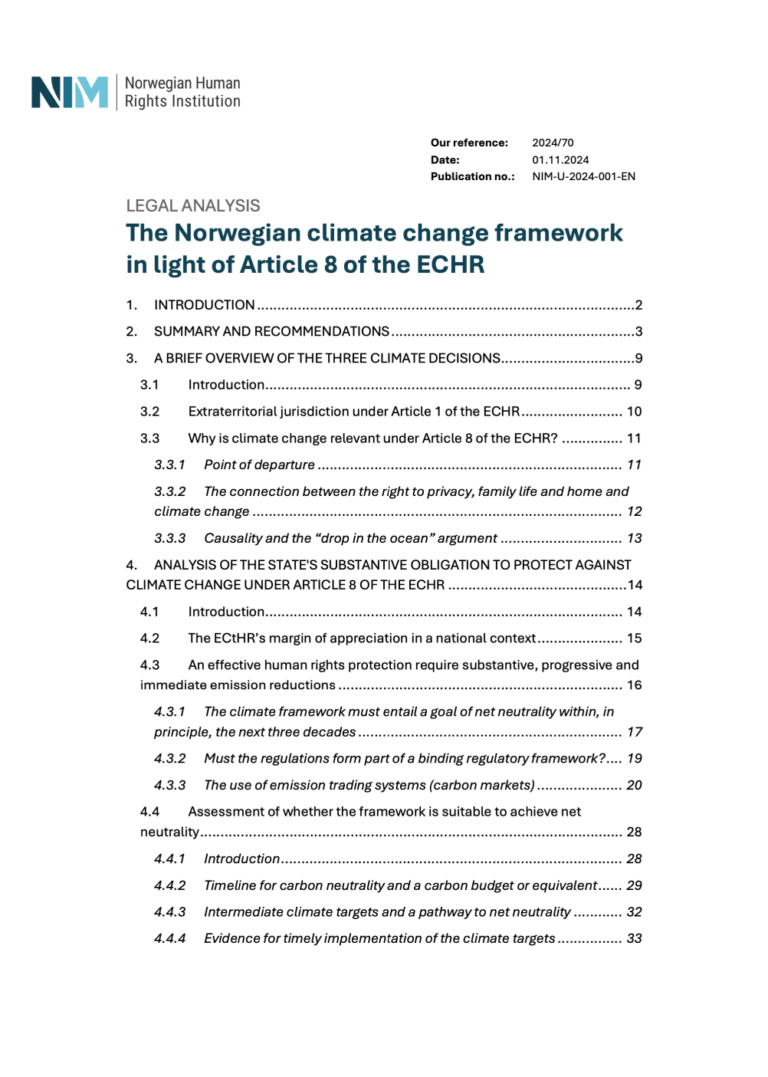In a historic ruling earlier this year, the European Court of Human Rights (ECtHR) concluded that Switzerland violated human rights by not reducing enough emissions. To advise the authorities on the follow-up to the ruling, NIM has examined what it could mean for Norway. The conclusion is that Norwegian climate change framework is unlikely to meet the requirements and should be strengthened.
A Paradigm Shift for Climate Policy
On April 9, 2024, the ECtHR ruled for the first time, in the case of KlimaSeniorinnen v. Switzerland, that States have a duty to protect their citizens’ life and health against serious adverse effects of climate change under Article 8 of the European Convention on Human Rights (ECHR).
The judgement represents a paradigm shift, as politicians in countries that are parties to the ECHR must now ensure that they uphold human rights in the field of climate change. Based on thorough assessments of the relationship between law and politics, the ECtHR concludes that authorities must have a legal and administrative framework that ensures that their greenhouse gas emissions are reduced substantially, progressively, and immediately . At the same time, the authorities have wide margin of appreciation to choose which climate measures they want to implement.
Switzerland was convicted of violating the ECHR because the authorities had not reduced enough emissions, adopted a carbon budget or similar national GHG emissions limitations, or legislated climate targets for the period between 2025 and 2030.
NIM’s Analysis and Conclusion
The ECHR is incorporated into the Norwegian Human Rights Act, and the government has announced a review of the ruling to ensure that Norway complies with the ECHR. In line with our advisory mandate, NIM has examined whether Norwegian authorities fulfill the obligation to protect their citizens from harmful climate change.
NIM’s conclusion is that the Climate Change Act is unlikely to meet the requirements under the ECHR, considering the ECtHR’s assessment in KlimaSeniorinnen. There are four reasons for this:
NIM’s Recommendations
NIM recommends that authorities strengthen the Climate Change Act. This will contribute to democratic anchoring of climate policy in Parliament and provide predictability for companies and individuals, as well as reduce the risk that Norway’s human rights obligations are not upheld. It will also reduce the risk of potential future climate litigation.
NIM recommends that the Climate Act enshrines:
- a duty to set a carbon budget up to 2050
- binding climate targets for 2035, 2040, and 2045
- annual roadmaps from the government to Parliament outlining the effects of climate measures and compliance with national climate goals
- the establishment of an independent climate council
Furthermore, NIM recommends that:
- a strategy is established to ensure a proportionate distribution of the burden of reducing national emissions between different generations
- the authorities quickly clarify the content of a possible new climate agreement with the EU
Questions?


